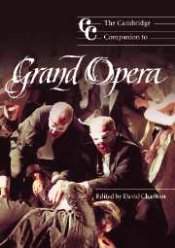As the editor discusses in the preface, this book concerns French opera from the 1820s and 1830s, and also its influence on works later in the century, as grand opera was adapted in other countries and inspired other composers to respond to the genre with their own works. This book is an exemplary volume which contains twenty chapters in which the contributors explore the development of grand opera, the elements essential to it, several representative works, and the influence exercised on composers like Wagner and others.
While parlance often renders grand opera as a term that could be applied to opera in general, an opera company, building, or institution, it is important to understand the origins of the musical style that had such a profound effect on the musical world. In the 1820s, as Paris became a center for opera which attracted musicians from various countries, the operas for the Parisian stage took on larger dimensions than had been previously explored in the genre. Grand opera involved librettos based on historical themes and, at times, took on elements of the French spectacle in their presentation. Likewise, the chorus became an integral part of the work, with the apposition of solo and choral textures used for dramatic effect. Ballet is also part of grand opera, and it was left to the ingenuity of the composers to find a way to include dance in the expanding artform.
Composers like Auber contributed some fine works to the stage, and the operas of Giacomo Meyerbeer established a new standard for opera composition. Several articles in this book discuss the works of these composers; in fact, Meyerbeer's major operas are the subject of two articles, one by Matthias Brzoska and another by John Roberts. Halévy was another influential figure, and his works are part of various discussions, not the least of which is the article devoted to his music by Diana R. Hallman.
Grand opera was not an end in itself, and its far-reaching impact is clearly presented in this volume. With Paris as an important center for opera, composers who wished to set their mark in the genre seem obliged to succeed there. Thus, Italian composers from Donizetti to Verdi either adapted their works for the French stage or composed works for it in the style of grand opera. Beyond the conventional wisdom that has operas for Paris requiring a ballet, works that were brought to France were sometimes reconceived in terms of grand opera, and thus result in different versions of works that were already successful elsewhere. By the same token, the transition that from the Rossini to Verdi involved an awareness of grand opera, as M. Elizabeth C. Bartlet points out in her contribution to this Companion.
Even Wagner was influenced by grand opera, since a success in Paris would guarantee a composer's future. His opera Rienzi was a grand opera in five acts that played a seminal part in his development as a composer. Thomas Grey provides some insightful perspectives on this work in his extensive article about Rienzi, and also shows how the style of grand opera emerged in other works by Wagner. Grey's comments about the ultimate blurring of elements from grand opera into Wagner's later operas might be read with other operas from later in the nineteenth century in mind:
Critics have often sought to separate the modern, philosophical Wagner, as composer and dramatist, from Wagner the stage-designer, still behold to antiquated notions of Romantic stage `realism.' Yet the ways in which he remained true to the ideals of grand opera were critical to his success in capturing the imagination of audiences in his own day, and probably now, as well. (p. 342)
It is possible to read this passage with other composers in mind, including the Verdi of Don Carlos and Un ballo in maschera (a photograph from a production of that operas is part of the cover of the present book), the early Puccini of Edgar and Le villi, as well as and the Richard Strauss of Guntram and Feuersnot - not without reference, too, to the influence of Wagner. Grand opera influenced the genre in other ways, as discussed in chapters devoted to Czech and Russian works and also opera in Italy during the latter part of the nineteenth century. As Sarah Hibberd states near the end of her chapter on grand opera in Britain and the Americas, "By the end of the nineteenth century . . . it is difficult to distinguish the influence of Meyerbeer from that of later composers. . . ." (p. 422). In a sense it is impossible to escape fully the ways in which grand opera reinvigorated the stylistic choices for composers to use in opera and the aesthetics through which audiences can perceive the grandeur and scope of this dynamic artform.
The Cambridge Companion to Grand Opera is an important contribution to study of opera because of the focus with which it treats a genre that is sometimes passed over. In fact, the entire book is well organized, with the individual articles are uniformly consistent and worth reading on their own. In addition to the editor's introduction, which sets the tone for the book, this Companion contains a chronology, which is useful in itself for understanding at a glance the context of the works discussed. Likewise, the bibliography of selected secondary sources provides references to important studies that readers may wish to pursue on their own. This book is essential for those interested in nineteenth-century opera - as well as the culture of the period - and those interested in this music should not miss it.
James L. Zychowicz
Madison, Wisconsin
